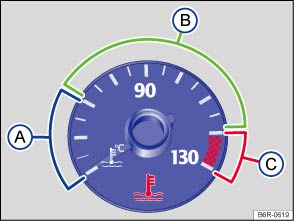Volkswagen Polo Owners Manual: Warning lamp and coolant temperature display

Fig. 138 Coolant temperature display in instrument cluster: Ⓐ cold; Ⓑ normal; Ⓒ warning
 First read and observe the introductory information
and safety warnings
First read and observe the introductory information
and safety warningsA display for the coolant temperature may be, depending on the vehicle equipment, located in instrument cluster. In normal driving conditions, the needle will be in the middle section of the scale. The temperature may also rise when the engine is working hard, especially at high ambient temperatures.
| Flashes |
Needle position |
Possible cause | Solution |
|---|---|---|---|
 |
Ⓒ Warning area |
Coolant temperature too high. |
 Do not drive on! Do not drive on!
Stop the vehicle as soon as possible, and when safe to do so. Stop the engine, let the engine cool down until the needle is back in the normal area. Check the coolant level . |
|
Ⓑ Normal area |
Coolant level too low. | After
the engine has cooled down, check the coolant level and refill engine coolant
if the level is too low . There is a fault if the coolant level is correct. |
|
| -- | Fault in the coolant system. |
 Do not drive on! Do not drive on!
Seek expert assistance. |
|
| -- |
Ⓐ Cold |
-- | Avoid high engine revs and heavy engine loads until the engine is warm. |
| Lit up | Possible cause | Solution |
|---|---|---|
 |
Engine coolant temperature is too low in vehicles with autogas engine. | Avoid high engine speeds and heavy engine loads. Wait until adequate operating temperature has been reached. |
Several warning and indicator lamps will light up briefly as a functional check when the ignition is switched on. They will switch off after a few seconds.

 WARNING
WARNING
- Always heed illuminated warning lamps and text messages.
- Never ignore any illuminated warning lamps or text messages.
- Stop the vehicle as soon as possible and when safe to do so.

 NOTICE
NOTICE
 Introduction
Introduction
This chapter contains information on the following subjects:
→ Warning lamp and coolant temperature display
→ Coolant specification
→ Checking the coolant level and refil ...
 Coolant specification
Coolant specification
First read and observe the introductory information
and safety warningsThe cooling system is filled at the factory with a mixture
of specially prepared water and at least 40% coolant additive G 13 ...
Other materials:
Indicator lamp
First read and observe the introductory information
and safety warnings
Lit up
Possible cause
Cruise control system (CCS) is controlling the speed.
Several warning and indicator lamps will light up briefly as a functional check
whe ...
Two-Part HS Vario Clear Coat
Definition:
Two-Part HS Vario Clear Coat -L2K 769 K01 A5-
Edition 06/2013
Product Description
Two-part HS vario clear coat is a VOC compliant (VOC value
less than 420 g/L), h ...
Introduction
This chapter contains information on the following subjects:
→ Petrol
→ Diesel
→ Autogas
Different engines require different fuels. The factory-fitted sticker on the
inside of the tank flap indicates the fuel type that is required for your particular
ve ...
